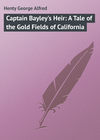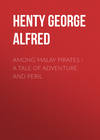Czytaj książkę: «Captain Bayley's Heir: A Tale of the Gold Fields of California», strona 9
"I tell you one had to keep one's eyes open in those days. We had strong crews, and every man was armed, and a pretty sharp lookout was kept; but for all that thar was places, back-waters, and cuts, and such like, whar I wouldn't have been stuck in after dark, not for all the money in Orleans. Even in the open river no one was safe from 'em, for they got so bold they would go out, four or five boat-loads, and attack in broad daylight; things got so bad that no one dared go up or down, unless it was ten or twelve boats together for protection. It war the steamers as broke 'em up; thar ain't no stopping a steamer, and every one took to being towed up or down. Then the population increased, and regular expeditions war got up to hunt 'em down. Altogether it got made too hot for 'em, and the game didn't pay; but for some years, I can tell you, they war a terror to the river."
"And were you never attacked, Hiram?"
"I was chased several times," Hiram said; "but I had a fast boat and a good crew, and we generally had four white men on board then, and plenty of arms. Yes, we had some skirmishes, but it was only once I had a regular set-to with 'em, and that war a pretty bad job."
"How was it, Hiram?"
"Well, you see, the river was pretty full, and the wind had been light for some time, and there warn't no way of making against the main stream; I had waited for three weeks, and me and my mates got sick of it. We had a cargo which was due up the river, and we made up our minds at last that we would push on and take our chance. We had eight negroes, all strong active fellows, armed with cutlasses and old ship muskets, and we four whites had rifles and pistols. We allowed we could make a good fight of it, so we agreed as we would go up the back-waters, so managing as to be able to get out into the stream every night and anchor thar. We shifted the cargo a bit, so as to pile it up round the sides, stowing the rice-bags so as to make a sort of breastwork; then off we started.
"For some days we got along well; the blacks poled thar best, and every evening we just hit a pint where we could go out into the stream agin. Two or three times we fancied we war watched, for we heard the snapping of twigs, and sounds in the thick swamp jungle ahead; but I reckon they thowt better of it when they saw two rifle-barrels peeping out from the sacks on each side, and saw we war ready for a tussle. But one day – it wasn't very far from the pint where we mended up that boat the other day – we war later than usual; the stream war stronger than we reckoned on, we had run aground two or three times on the mud, and it war getting dark, and we had two miles yet before we got to a place where we could get out into the river. The blacks war working thar hardest; it didn't need no words from us to keep 'em at it, for they knew as well as we did what was the danger, and the boat just flew along that narrow channel."
"We war on the watch, with our eyes fixed on the bank, and our ears pretty wide open to catch any sound ahead. All of a sudden a gun was fired close alongside. The blacks gave a yell, and would have jumped down into shelter, only I shouted, 'Stick to your poles, men; if you lose them we are done for; there's no danger, it's only one man.' So on we went again, for, luckily, no one was hit. 'That's a signal,' Bill, says I to one of my mates; 'I reckon we shall have trouble afore we are out of this.' On we went, flying between the bushes, which warn't fifteen yards apart. Not a sound was heard but the panting of the blacks, the splash of their poles in the water, and a sort of sighing noise behind, as the ripples the boat made as she glided along rustled among the boughs which dipped down into the stream.
"We had got a mile further when we heard a noise. It was much as a pole might make knocked against the side of the boat. I knew thar was mischief now. 'Get in your poles, lads,' I said; 'four of you get out oars through the holes we have left for them atween the bags, and put your muskets close at hand; the other four get your muskets, and station yourselves two on each side.' We went on slowly now; we knew they war ahead of us, and that hurrying wouldn't do no good, and that we had got to fight anyhow. It might have been five minutes when thar was a flash from the bushes on either side – which we could scarce see in the darkness, – and fully a dozen muskets poured a volley into us, buckshot and ball, as we found on looking over the boat the next morning. It was a good job as we put them rice-bags in place, for I reckon thar wouldn't have been many of us up to fighting if they hadn't been thar. We had agreed not to fire back if we war fired at from the wood, for they couldn't do us much harm thar, and it was best to keep our fire for the boats which they war sure to have as well.
"The moment the volley was fired two boats shot out, one from each side. 'Now, give it 'em,' says I. Up we jumped, four on each side, and poured our fire into the boats, which warn't twelve feet away. The darkies who war rowing had been told what to do, and, to do 'em justice, they did it well. Thar was a yell from the boats as we fired, for I reckon every shot told; but the way they had got brought 'em on, and their bows struck us just at the same moment. Then at it we went with our pistols as they crowded forward and tried to get on board. It was over in half a minute, for the four blacks had seized their poles, and, shoving them into the boats, two on each side, pushed 'em off.
"I have heard pretty tall language on the Mississippi, but I never heard such volleys of cussing as came up from them boats; some of the men blazed away with thar guns, some shouted to others to row alongside, some who war hit yelled and cussed like fiends; and all this time we war lying behind the bags, ramming down fresh charges for the bare life. We gave 'em eight more shots before they could cast off the poles and come at us again. This time they came along more on the broadside, and five or six of 'em sprang on board; but we war ready with the butts of our rifles, and the blacks with thar cutlasses, and we cleared them off again. The four darkies had stuck to thar poles; one boat was shoved off, and one of the blacks run his pole right through the bottom of the other, and in a minute she went down.
"The other boat didn't know what had happened, and came up agin; but leaving two of the blacks to chop down any of the fellows in the water who might try to climb aboard, the other ten of us stood up and fought 'em fair. Our blood was up now, and our darkies fought like demons. The pirates soon found they had the worst of it, and would have got apart from us if they could; but we jumped into thar boat and fought them thar, and they soon jumped over and made for the bank. Directly it was over they began to fire agin from the shore, and we jumped back into shelter agin in our own boat and manned the four oars agin. We fastened the painter of the boat on to our stern, and towed her behind us, and in another half an hour were out in the stream. It was a toughish fight, I can tell you, while it lasted; two of the blacks and one of my mates had been hit by thar musket-balls, and the rest of us war either gashed by thar knives or had got ugly cracks. However, six of them war lying in the boat when we hauled it alongside; two war stone-dead, the other four had been stunned with the butt ends of the muskets, or cut down by the darkies' sabres. We took 'em down to the next place and handed 'em over to the sheriff; and as thar happened to be a lot of boats waiting thar for the wind, you may guess it warn't many hours afore they tried and hung 'em.
"When the chaps heard the particulars, and that we had sunk one boat, besides bringing off another, they guessed as likely enough the pirates war trapped thar; and so they got up a regular expedition, six boats, each with a dozen men. I went back to show 'em the place. They brought dogs with them, and hunted through the woods and swamps till they came to the patch of higher ground whar the pirates had got thar huts. Thar were about twenty of 'em, mostly negroes, and they fought hard, for thar was no escape, the boat having drifted away after it had sunk. Behind thar war some widish channels, and some of the boats had gone round thar to cut 'em off if they took to swimming. They war killed, every man jack, and that put an end to one of the very worst lots of pirates we ever had on the river."
"You were lucky to have got out of it so well, Hiram. I suppose that sort of thing is quite over now."
"Yes. In course thar are water thieves still, chaps who steal things from the boats if thar is no one with 'em, or if you are all asleep below; but thar haven't been no real pirates for years now – leastways not above New Orleans. Down in the great swamps, by the mouth of the river, thar's always gangs of runaway slaves, and desperate characters of all sorts, who have got to live somehow. Thar are still boats sometimes missing up the river, which may have been snagged and gone down with all hands, and which may be have comed to thar end some other way. Anyhow, no one thinks much about pirates now, and the river's quite as safe as the streets of New Orleans. That mayn't be saying much, perhaps, but it's good enough. Of course a party might any day take to the swamps and stop up-passing boats, just as they might take to the roads and stop waggons going west; but one doesn't trouble about things onless they get so as to be what you might call a general danger.
"You can't go into a bar-room without a risk of getting into a fight with a drunken rowdy; you can't stop at one of these landing-places but what thar's a chance of getting into a mess with fellows who come in from the backs for a spree, and one doesn't look to have these rivers which, one and the other, are tens of thousands of miles long, just kept as free from hard characters as a street in Boston. It's as good as we can look for at present. Settlement is going on wonderful fast, and, like enough, in another forty years there won't be any more pirates on the great rivers here than thar are on the seas. Steam and settlements is bound to wipe 'em out at last."
During the last two or three hundred miles of the journey up the Missouri a few settlements only were passed, little villages nestling closely together on the edge of the river, surrounded often by a stockade; for although the Indians were gradually falling back before the advance of the whites, Indian wars were of frequent occurrence, and then the bands of wild horsemen swept down to the Missouri, carrying fire and destruction in their course. In front of every settlement lay a scow or two, used partly for the transportation of the crops, but valuable also as an ark of refuge in case of attack. The shores were low, and shallows and banks abounded in the stream, and sometimes the tug ran aground four or five times in the course of the day. In spite of his practice with his firearms, and Hiram's talk and stories, Frank began to find the days pass very slowly, and was not a little glad when Hiram pointed out a cluster of huts on the left bank, and said, "There is Omaha."
Half an hour later the tug was alongside, and Mr. Willcox was on board.
"I am glad to see you up," he said, as the flats were moored to the bank, and Frank stepped ashore and joined him. "The time has gone slowly here; for though I stayed four days at St. Louis, I have been here nearly a week. There is lots to do, and I am greatly pleased that I went in for it. I wish you could have made up your mind to settle here; you would have made a precious deal better thing of it than you ever will do by digging for gold. However, I know it's no use talking about that. I have got a capital location on the main street; I bought it off a fool who came up in the steamboat with me, and had made up his mind to sell out and cross the plains. I had an offer for it yesterday at five times the price I gave for it; but, bless you, I wouldn't have taken twenty times. This is going to be a big place. I am glad you have come for another reason. I am putting up at one of the shanties they call an hotel, but one might as well try to live in the Tower of Babel. There is an uproar day and night; every inch of the floor is taken up for sleeping on, and I have been nearly driven out of my mind. Now I can live on board the tug till she goes down with the empty flats. I am glad I brought up those eight negroes, for there would be the greatest difficulty in hiring hands here; every one seems to have gone stark mad, and to consider every hour's delay in pushing west as so much loss of a chance of making a fortune."
For the next fortnight the labour was incessant. Hiram, Frank, and the eight negroes toiled in landing the stores and the framework of the house, and in transporting them to the lot which Mr. Willcox had purchased. Even the engineers of the tug were induced by the high payment Mr. Willcox offered to aid in the work. Several stretchers, or hand-barrows, had been brought up with them, and on these such bales and boxes as were too heavy for one man to carry were transported. The framework of the house was first carried to the site, and four of the negroes who were good carpenters at once began to put it together, so that by the time the last of the goods were brought up the store was ready to receive them. It was a building some sixty feet long by twenty wide, and was divided into two by a partition: the one end, twenty feet in length, was the saleroom; in the other, forty feet long, the bulk of the heavy goods, flour, rice, bacon, hogsheads of sugar, and chests of tea, were stored. There was, in addition, a lean-to, nine feet square, at one end, which was to serve as the habitation of the storekeeper. The assortment of goods was very large. In addition to the stock of provisions, which filled the storeroom nearly up to the roof, were a great quantity of clothing fitted for the rough work of the plains, a large assortment of rifles and pistols, kegs of ammunition, casks of axle-grease, ironwork for waggons, and all the miscellaneous stores, down to needles and thread, which would be likely to be required by the emigrants. As soon as the stores were all safely on shore and housed, the tug started down the river again with the flats; Hiram and six of the negroes accompanied them, two of the latter being retained as assistants to the storekeeper. Between Hiram and Frank there was a very cordial adieu.
"I likes yer, young fellow," the boatman said; "you will make your way, never fear, some day, if you get a chance. Send a line to me, to the charge of the boss, and let me know how things go with you. I shall be gladder than I can tell you to hear as you're making your way, and I shall be anxious like till I hear as you have got safely over this journey, for they do say as the Indians are playing all sorts of devilry with the caravans. Well, there's one thing, you are a good shot now; but be careful, lad, and don't get into no fights if you can keep out of 'em."
Frank remained for another fortnight assisting in the store; by the end of that time things had settled down. They were already doing a very large business, and Mr. Willcox had sent down orders, both to St. Louis and New Orleans, for fresh consignments of stores very greatly exceeding those which he had brought up with him.
Three months previously Omaha had been a tiny settlement of a dozen houses, but was rapidly growing into a considerable place.
Many stores were rising, but the distance from the inhabited settlements, and the difficulties of carriage, were enormous. The population was, for the most part, a floating one, scores of waggons and vehicles of all sorts arriving every day, while as many departed. This was the last point of civilisation, and here the emigrants generally halted for a few days to rest their weary cattle, and to fill up their stores of provisions for the journey across the wilderness.
All believed that a vast fortune awaited them on the other side of the continent, and the most fabulous tales of the abundance of gold were circulated and believed. In some cases the parties consisted only of men who had clubbed together and purchased a waggon, and started, leaving their wives and families behind them. In others they were composed of whole families, who had sold off farms or businesses in the east in the assurance of acquiring a fortune at the gold-diggings. Around the little settlement the plain was dotted with the white tilts of the waggons, mingled with the tents which had been extemporised of sail-cloth, tarpaulins, and blankets.
CHAPTER IX.
ON THE PLAINS
"I THINK now that you can spare me, Mr. Willcox," Frank said, just a month after the day of landing. "The store has got into swing now; the two negroes know their work well, and everything is going on smoothly; therefore, if you have no objection, I shall see about making a start."
"I shall be sorry to lose you," Mr. Willcox said; "but, as you say, the place will run itself now. I shall go down by the next steamer, and send up two more storekeepers and a clerk from my office there. This is going to be a big thing. Well, lad, here's the money you gave me to take care of, and the two hundred dollars due to you. I will give orders to Simpson that you are to take everything you can require for your journey from the store, and mind don't stint yourself; you have done right-down good service here, and I feel very much indebted to you for the way you have stuck to me at this pinch. I wish you every luck, lad, and I hope some day that rascally affair at home will be cleared up, and that you can go back again cleared of that ugly charge. Anyhow, it is well for you to make your way out here. It will be a satisfaction for you, if you do go back, to have shown that you were dependent on no one, but that you could fight your own way, and make your living by the aid of your own hands and your own brain. And now look here, if at any time you get sick of gold-digging, as you very well may, and want to turn your hand to anything else – and in a country like that, mind you, with a population pouring in from all parts, there will be big opportunities, – if you want capital to start you, just you send a letter to David Willcox, New Orleans, and tell me you have drawn on me for five thousand dollars. I am a rich man, lad, and have no children of my own; I have some nephews and nieces who will get my money some day, but I can do what I like with it, and you will be heartily welcome to the sum I mention. I have taken a fancy to you, and it will be a real pleasure to me to help you. If you do well you can some day send the money back, if you like; if you don't do well, there's an end of it. Don't let it trouble you for a moment, for it certainly won't trouble me, and be sure you don't hesitate to draw it when you want it. Remember, I shan't regard it as an obligation, but it will be a real genuine pleasure to me to cash that order."
Frank thanked Mr. Willcox very heartily for his kind offer, of which he promised to avail himself should an opportunity arise, and in any case to write to him occasionally to tell him how he was getting on. Then he strolled out to examine the great gathering round the settlement, which hitherto he had had no time to do, having been at work from daybreak until late at night. As he wandered among the motley throng of emigrants, he was struck with the hopefulness which everywhere prevailed, and could not but feel that many of them were doomed to disappointment. Many of them were storekeepers, men who had never done a day's work in their life; some were aged men, encumbered with wives and large families, and Frank wondered how these would ever survive the terrible journey across the plains, even if they escaped all molestation from the marauding Indians. He paused for a moment near four men who were seated round a fire cooking their meals.
All were sturdy, sunburnt men, who looked inured to hardship and work. The fact that all were animated by a common impulse rendered every one friendly and communicative, and Frank was at once invited to sit down.
"Of course you are going through, young fellow?"
"Yes," Frank said, "I am going to try."
"Got a horse, I suppose?"
"Yes," Frank said, "a riding horse, and a pony for my baggage."
"We calls it swag out on the plains," one said; "we don't talk of baggage here. Are you with any one?"
"No," Frank replied, "I am alone; but I am open to join some party. I suppose there will be no difficulty about that."
"None on airth," the other answered; "the stronger the better. In course you have a rifle, besides that Colt in your belt."
"Yes," Frank replied; "but I suppose all this Indian talk is exaggeration, and there is not much danger from them."
"Don't you go to think it, young man; the Injins is thar, you bet, and no mistake, and a big grist of scalps they will take. The news of this here percession across the plains will bring them down as thick as bees on the track, and I tell you there will be some tough fights afore we get across."
"Have you had much experience of the plains?" Frank asked.
"We are hunters," the other said briefly, "and have been out there, more or less, since we were boys. We knows what Injins is, and have fought them agin and agin; but none of us have ever made this journey, – indeed there warn't five men who had ever crossed the Rockies by the northern track afore the gold scare began. But I know enough of the country to know as it will be a fearful journey, and full half of these people as you see fooling about here as if they were out for a summer excursion will leave their bones by the way."
"You don't really think things are as bad as that," Frank said.
"I does," the other replied emphatically. "What with Injins, and want of food and water, and fatigue, and the journey across the plains, it will want all a man to make the journey. We four means to get through, and are bound to do it; but as for this crowd you see here, God help them!"
"Do you mean to go with one of the caravans, or start alone?"
"There is a lot going on to-morrow, and we shall join them. We may be of some use, for the best part of them are no better than a flock of sheep, and four good hands may keep them out of some mischief; but I expect we shall have to push on by ourselves before the journey is over."
"I am intending to go on to-morrow also," Frank said, "and I hope you won't mind giving me some instructions in the ways of the wilderness, which are, I own, altogether new to me."
"All right, young fellow; we shall see you on the road, and if you likes to chum up with us you may, for I likes yer looks, and you seems to be one of the right sort."
Frank said that he would gladly chum with them if they would allow him, and the next morning, at daybreak, having said adieu to Mr. Willcox, he saddled his horse and loaded up his pony, and moved across to the spot where his new acquaintances were encamped. They were preparing for a start. All had good riding horses, while two baggage animals carried the provisions for the party. The caravan which they intended to accompany was already far out on the plain.
"They are off in good time," Frank said; "I did not think they would manage to move till midday."
"No more they would," one of the hunters said; "but the chap as is bossing the team moved them off yesterday evening, and got them a mile out of camp, so they were able to start right off the first thing this morning."
In a few minutes they were on horseback, and, riding at easy pace for the sake of the baggage-horses, they overtook the caravan in two hours. It consisted of fourteen waggons, and four or five light carts with tilts over them. The waggons were all drawn by oxen, having six, eight, or ten according to their size or weight. The men walked by the side of their cattle; the greater part of the women and children trudged along behind the waggons, while a few with babies were seated within them. From time to time one of the men or boys would set up a song, and all would join in the chorus. One of these was ringing out in the air when the hunters joined them.
"Poor critturs!" the eldest of the hunters, who was called Abe by the others, said, "they are as light-hearted as if they war a-going to a camp meeting; they don't know what's afore them."
The party rode on to the head of the waggons, where the oxen were led by the man who was regarded as the head of the party. He had at one time been a hunter, but had married and settled down on a farm. Two sons, nearly grown-up, walked by his side. He had been chosen as leader by the rest as being the only one of the party who had any previous knowledge of the plains and their dangers and difficulties.
"Well, mate," Abe said, "I told you two days ago that I thought that we should go on with your lot, and here we are. I don't say as how we shall go all the way with you; that will depend upon circumstances; at any rate we will stay with ye for a bit. Now my proposal is this: you shall hitch our three baggage-horses on behind your waggons, and tell off one of the boys to look after them; we shall hunt as we go along, and what meat there is will be for the service of the camp, but if we supply you with meat it will only be fair that you supply us with flour and tea."
"That's a bargain," the man said. "You bring us in meat, and we will supply you with everything else; and I needn't tell you how glad I am to have you with me. Five extra rifles may make all the difference if we are attacked. We have got about twenty rifles in camp; but that ain't much, as, with women and children, we count up to nigh sixty souls, and none of us here except myself have had any experience of Indian ways."
"That's fixed, then," Abe said. "At any rate you need not be afraid of a surprise so long as we are with you."
The addition to their party gave great satisfaction to the whole caravan. Of flour and bacon they had ample stores to last them upon their long journey, and the prospect of a supply of fresh meat was exceedingly welcome; still more was the thought that the hunters would be able to warn them against any surprise by the Indians, and would, in case of the worst, aid them in their defence.
The hunters were equally satisfied. Their supplies were quite insufficient for the journey, and they were now free from the necessity of accommodating their pace to that of the baggage-horses. Their progress would, indeed, be slower than it would have been had they journeyed alone, but time was a matter of no importance to them. Even in the matter of Indian surprises they were better off than they would have been had they been alone. In case of meeting these marauders, they must have abandoned their baggage-animals; and their prospects, either of flight or defence, would have been poor had they met with a large body when alone, whereas the force with the caravan could defend the waggons against even a resolute attack of the redskins. There was no occasion for the hunters to set out in the pursuit of game for the first day or two, as a supply of fresh meat had been brought from Omaha. They therefore rode with the caravan, making the acquaintance of its various members.
One of the women had volunteered to cook for them; and thus, when they encamped on the banks of a small stream, they had only to attend to the watering of their animals. While the meal was preparing they walked about in the camp, and gave many hints to the women as to the best way of preparing fires. These were gratefully received, for the emigrants were wholly unaccustomed to cooking without the usual appliances, and their efforts, in many cases, had been very clumsy and unsuccessful. They were surprised to find that by digging a trench in the direction from which the wind was blowing, and covering it over with sods, they could get a draught to their fire equal to that which they could obtain in a grate; while by building a low wall of sod close to leeward of the fire, they prevented the flames from being driven away, and concentrated them upon their pots and kettles.
"It does not matter for to-night," Abe said to the leader, "nor for a good many nights to come; but if I was you I should begin to-morrow to make 'em arrange the waggons in proper form, the same as if we was in the Injin country. It ain't no more trouble, and there's nothing like beginning the right way."
"You are right," the man said, "to-morrow night we will pitch them in good form; but for a time there will be no occasion for the cattle to be driven in every night, the longer they have to graze the better."
"That's so," Abe said; "they will want all their condition for the bad country further on."
The following day the hunters left the camp early. There was little chance of finding game anywhere near the line which they were following, for the wild animals would have been scared away by the constantly passing caravans. After riding for ten miles they began to keep a watchful eye over the country, which, although flat to the eye, was really slightly undulating. Proceeding at an easy pace, they rode on for upwards of an hour. Then Dick, one of the hunters, suddenly drew rein.
"What is it, Dick?" Abe asked.
"I saw a horn over there to the left, or I am mistaken," the hunter said.
"We will see, anyhow," Abe said; "fortunately we are down wind now. You had better stop behind this time, young fellow, and watch us."
In a moment the four men dismounted and threw their reins on the horses' necks – a signal which all horses on the plains know to be an order that they are not to move away – and the animals at once began cropping the grass. For a short distance the men walked forward, and then, as they neared the brow over which Dick declared he had seen the horn, they went down on all fours, and finally, when close to the brow, on their stomachs.




















